In a groundbreaking discovery that has left both historians and anthropologists astounded, recently unearthed footage from 1860 has shed light on one of the most mysterious and intriguing families in history—the so-called “Longest Neck Family.” This rare footage, which offers a glimpse into a world long forgotten, has finally revealed the secret behind the extraordinary physical trait that has fascinated scientists and the public alike for generations.
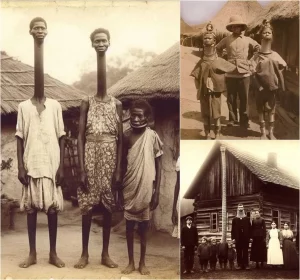
The “Longest Neck Family,” known in whispers and folklore, has been the subject of speculation for more than a century. Residing in a remote village, their astonishingly elongated necks defied the norms of human anatomy, sparking endless curiosity and debate. Historians have often wondered whether this trait was the result of a unique genetic mutation, cultural practices, or perhaps even something more mystical.
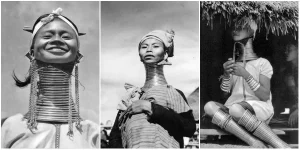
The footage, discovered in an old chest during the renovation of a historic estate in Europe, is believed to be the earliest known film of its kind. The grainy black-and-white images show members of the “Longest Neck Family” engaged in everyday activities—walking, gathering food, and interacting with one another—while their remarkably elongated necks are prominently on display.
Experts who analyzed the footage were initially skeptical of its authenticity, given its age and the remarkable nature of its content. However, after rigorous examination and validation using advanced technology, the footage has been confirmed as genuine, offering an unprecedented glimpse into the lives of this enigmatic family.
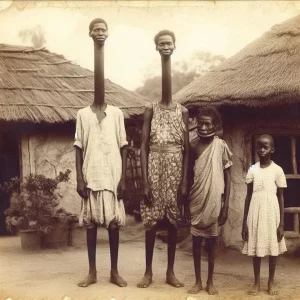
The most astonishing revelation from the footage is the clear evidence of an ancient cultural practice that appears to have contributed to the family’s elongated necks. The footage shows the family members, including children, wearing a series of intricately crafted neck rings made of gold and other metals. Over time, the gradual addition of these rings appears to have extended their necks to incredible lengths, a practice similar to those observed in certain cultures around the world, such as the Kayan people of Myanmar.
The footage also reveals that this practice was not merely for aesthetic purposes. It was deeply rooted in the family’s traditions, symbolizing status, beauty, and perhaps even spiritual significance within their community.
This discovery has profound implications for the study of human cultures and physical anthropology. For years, the existence of the “Longest Neck Family” had been dismissed by some as a myth or an exaggerated tale, but this footage provides concrete evidence of their unique way of life. It also opens new avenues of research into how cultural practices can significantly shape human anatomy over generations.
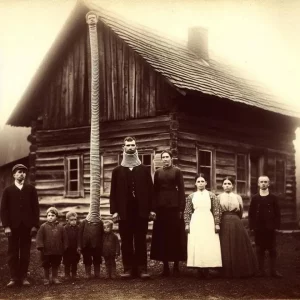
Anthropologists are particularly excited about the possibility of comparing this family’s practices with those of other cultures known for neck elongation, potentially uncovering connections and influences that span continents and centuries.
The release of the footage has captivated the public, sparking renewed interest in the mysterious family and the broader implications of their practices. However, it has also raised ethical questions about the portrayal and study of such practices, especially given the family’s likely lack of consent to being filmed.
Historians and anthropologists are calling for a respectful and measured approach to the study of this footage, emphasizing the need to honor the cultural significance of the practices depicted while seeking to understand them within a broader historical context.
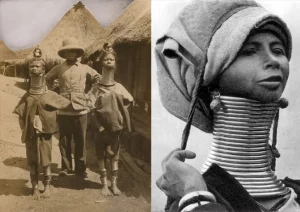
The unearthed footage from 1860 has provided answers to one of history’s most intriguing mysteries, revealing the secret behind the world’s longest neck family. This discovery is not just a window into a unique cultural practice but a testament to the diversity and complexity of human traditions. As researchers continue to study the footage, we may yet learn more about this remarkable family and the cultural forces that shaped their extraordinary physical trait.